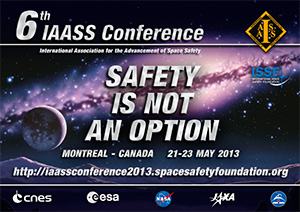 Welcome back to Space Safety Magazine! We are glad to announce that the sixth IAASS international space safety conference “Safety is Not an Option” will be held 21-23 May, 2013, at McGill University in Montreal, Canada. The conference, organized in cooperation with the International
Welcome back to Space Safety Magazine! We are glad to announce that the sixth IAASS international space safety conference “Safety is Not an Option” will be held 21-23 May, 2013, at McGill University in Montreal, Canada. The conference, organized in cooperation with the International
Space Safety Foundation (ISSF), Mc-Gill University, and the Canadian Space Agency, is an invitation to reflect and exchange information on a number space safety and sustainability topics of national and international interest. The conference is also a forum to promote mutual understanding, trust, and the widest possible professional international cooperation in such matters.
The once exclusive “club” of nations with autonomous suborbital and orbital space access capabilities is becoming crowded with ambitious new entrants. Commercial spaceports are being built and are becoming operational. In the manned spaceflight arena, the historic flight to ISS of the private SpaceX Dragon spacecraft, which will soon be followed by Orbital Science’s Cygnus, is inaugurating the era of commercial spaceliners
providing commercial cargo and crew transportation services to orbit. International cooperation, both civil and commercial, is also gaining momentum. In the meantime, robotic space exploration will accelerate and with it the need to better internationally regulate the unavoidable
usage of nuclear power sources.
Space bound systems and aviation traffic will share a more and more crowded airspace, while aviation will increasingly rely on safety-critical services based in near-space for navigation, air traffic control, and communication. Finally, most nations nowadays own important space assets, mainly satellites of various kinds and purposes, which are under the constant threat of collision with other spacecraft and with the ever increasing number of space debris. Without effective initiatives we risk negating access and use of space for future generations. Awareness is increasing internationally, (as solemnly declared decades since in space treaties), that space is an asset of all mankind and that we all have the duty to care for it.
Usually about 150 papers are selected for presentation at IAASS conferences. The representations are grouped in 40 sessions, including panel discussion sessions. The conference sessions provide participants with specialized insight, innovative strategies, and open discussion
on important aspects of space safety. At the sixth IAASS Conference there will be sessions on classical topics of design for safety and risk assessment/management as well as specialized sessions on three main topics which need to garner more attention from the space community: Space Debris Remediation, International Space Traffic Control, and Commercial Human Spaceflight Safety. Active removal of dead satellites and spent launcher upper stages from orbit and international coordination of space traffic are mandatory steps both for safe orbital operations
as well as for the safety of the public on the ground. The safety of commercial human spaceflight is a critical element for the expansion, and perhaps even continuation, of human spaceflight. The success of commercial spaceflight requires the achievement of a substantially higher
level of safety – not solely a reduction in costs.
At the occasion of the IAASS safety conference we recognize leading safety professionals and safety conscious inventors and designers with awards like the “Jerome Lederer – Space Safety Pioneer” award and the “Vladimir Syromiatnikov – Safety by Design” award. Please visit the IAASS website www.iaass.org for more information on how to submit nominations for these prestigious IAASS awards. We look forward to receiving your abstracts.
Best regards
Tommaso Sgobba, IAASS President.

















































































































![A trajectory analysis that used a computational fluid dynamics approach to determine the likely position and velocity histories of the foam (Credits: NASA Ref [1] p61).](http://www.spacesafetymagazine.com/wp-content/uploads/2014/05/fluid-dynamics-trajectory-analysis-50x50.jpg)



Leave a Reply